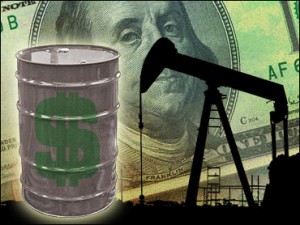Betting On The Barrel: Experts Warn Speculation Is Helping Drive Up Oil Prices
 There are growing indications that Wall Street speculators are driving up the price of crude and Americans are paying for their profits at the pump.
There are growing indications that Wall Street speculators are driving up the price of crude and Americans are paying for their profits at the pump.“Americans overpaid $10 billion dollars for gas at the pump in the last month alone,” said Gene Guilford, president of the Independent Connecticut Petroleum Association, speaking at a Democratic Steering and Policy Committee hearing held on April 4. Guilford estimated that speculation is adding roughly 75 cents per gallon of gas.
The high price of gas is not simply due to supply and demand mechanisms, but instead perceived supply and demand. Currently, a majority of oil trades are made by Wall Street speculators rather than commercial end users of oil. There is increasing evidence that these traders are having a powerful influence on the price of petroleum.
Here are some notable indicators:
“The benchmark U.S. oil price fell Wednesday to $101.47 in New York, its lowest level since mid-February, but still well above where analysts believe it should be with supplies up and demand down.”
The CEO of Exxon Mobil said in May 2011 that the price of a barrel of oil “should be in the $60 to $70 a barrel range.”
“Historically, financial speculators accounted for about 30 percent of oil trading in commodity markets, while producers and end users made up about 70 percent. Today it’s almost the reverse.”
The Federal Reserve Bank of St. Louis reports financial speculators have accounted for about 15-20 percent of the increase in price for crude oil in the last decade.
Commodity Futures Trading Commissioner Bart Chilton recently cited numerous independent studies indicating excessive Wall Street speculation is driving up the price of gas.
So what to do about it?
House Minority Leader Nancy Pelosi (D-CA) recently heard candid testimony from two experts on the issue: Michael Greenberger, a former federal regulator of financial markets, and ICPA’s Gene Guilford.
Representative Edward Markey (D-MA) asked the panelists about policies they would promote to help loosen Wall Street’s grip on the price of gas. Michael Greenberger had three suggestions:
Increase funding to the Commodity Futures Trading Commission — which monitors oil trades— paid for by a tax on every dollar crude-oil speculators gamble with in the oil commodities market.
Allow the Department of Justice and the FBI to follow through with investigations concerning excessive crude-oil futures trading by Wall Street speculators.
Reform the Commodity Index Swap and Synthetic Exchange Rated Fund regulations to protect against rampant speculation practices.
Political opponents continue to claim Obama is to blame for high oil and gasoline prices, even while oil production has skyrocketed under his administration.
The Energy Information Agency reported that U.S. oil production last year hit 5.65 million barrels per day, a 14% increase from 2008. For the first time in 60 years, the U.S. is now a net refined fuel exporter. Even more, U.S. domestic oil consumption has been down by 10 percent since 2008.
However, gas prices continue to climb. In February 2012, the national average for regular grade gasoline was $3.58 a gallon, an 11.5 percent increase compared to February 2011.
You can return to the main Market News page, or press the Back button on your browser.

